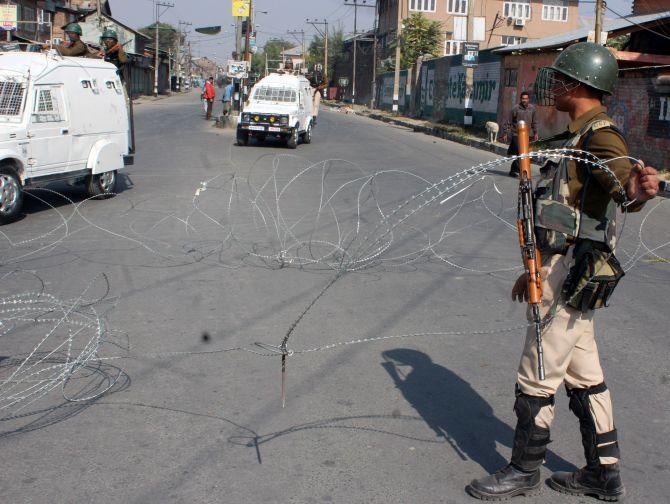Since investment demands political and social stability, the Centre needs to offer investors something beyond heavy troop concentration and police presence as the sole guarantors of the ease of doing business, says Kanika Datta.

India Inc is seeking to match the warp speed displayed by Narendra Modi and Amit Shah over developments in Jammu & Kashmir, with the Confederation of Indian Industry planning its first-ever investor summit in the state-turned-Union territory this October.
Irrational exuberance or misplaced optimism? Premature exuberance may describe it better.
The big picture of business prospects in J&K, as presented by the industry lobby, certainly looks enticing: sans land and labour major constraints in the pre-Article 370 days, dealerships, food-processing units, small and medium manufacturing and expanded tourism will all transform a state that suffers chronic high unemployment and low development.
As a state, J&K has a low internal Ease of Doing Business ranking for obvious reasons. But surprisingly, it outperformed nine others in terms of Human Development Indicators -- among them West Bengal and Rajasthan -- which suggests there is a reasonably educated and healthy workforce to be tapped.
Still, there are compelling reasons for industry to have followed what Indians are wont to call the “wait and watch approach” -- and, no surprise, most businesspeople when asked about their J&K proposals said they planned to do exactly this.
An investor summit in J&K may do much to improve the optics for a political initiative that has been deemed so good for the people of J&K that its citizenry needs to be kept under lockdown for the foreseeable future. But such summits themselves are of dubious practical value. They have been in vogue for over a decade, the trend set by Mr Modi as chief minister of Gujarat, though no state has quite matched the rock-concert character of those events.
The Gujarat summits set the pattern. A bunch of potential high-profile investors is invited to attend a jamboree at which the chief minister concerned (and sometimes the bureaucrats) outline the various (mostly illusory) virtues of investing in the state. This includes enticements in the form of tax breaks (greatly restricted post-GST) and assurances of solutions to land and labour issues that routinely bedevil most manufacturing in India.
Then some prominent industrialists -- Gujarat and West Bengal have been able to mobilise no less than Mukesh Ambani -- will make speeches about the (again, mostly imaginary) virtues of the state concerned. Some level of discussion takes place behind the scenes between business people and the bureaucracy. Finally, the state’s PR machinery gets into action and announces promised investment commitments (called memorandums of understanding) worth stupendous crores of rupees.
Little of this translates into even a shovel in the ground for a variety of familiar reasons.
It is possible that J&K may buck this trend and see a long queue of serious investors actually putting hard cash behind their intentions and transforming the country’s newest Union territory into a developmental paradise.
Every Indian -- including the curfewed Kashmiris -- would be delighted if this were to happen.
The problem is this: reading down a constitutional provision may well have corrected a historical mistake; whether it will change the situation on the ground is another matter.
J&K’s lack of development has less to do with the limitations on land ownership and employment and more to do with the fact that between them, the central and state leadership has managed the relationship with Pakistan so badly that it has condemned J&K to a state of permanent unrest. Those externalities are unlikely to change anytime soon.
Since investment demands political and social stability, the Centre needs to offer investors something beyond heavy troop concentration and police presence as the sole guarantors of the ease of doing business.
Israel, which is often cited as an example of a country that has attained an economic miracle under constant siege, is scarcely the kind of model India should emulate if it is serious about integrating its minorities. Some sort of enlightened plan to counter Pakistan and China’s territorial ambitions is a vital part of this exercise.
This is not yet in evidence. It is unlikely that those investors who attend the summit in October, one of the best times of the year in that beautiful region, are unaware of these obvious hurdles.
No matter, at least they will bump up the embattled state’s waning tourism industry for a couple of days.












 © 2025
© 2025